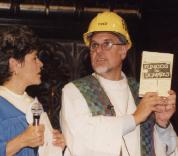 | |||||||||||
 | |||||||||||
By Professor Jackson W. Carroll A change of pastors is a key moment in the life of any congregation. It is a time for assessing the point to which the congregation has come under the leadership of the departing pastor and where it would like to be led in the future by a new pastor. It is also a time of coming to terms with members’ grief at the leaving of a well-loved pastor, or, in some cases, it is a time of relief that a not-so-well-loved pastor is departing and new leadership is taking the helm. Anthropologists speak of “liminal” or “threshold” moments in organizations or communities, and a pastoral change is just a time. Liminal moments in a change of pastors involve a first stage of separation accompanied by either grief or relief as the old pastor leaves; a middle period of transition or ambiguity in which the new pastor is “tried out” and accorded a kind of “honeymoon”; and, if the transition is successful, a final stage of acceptance where she or he is given the congregation’s blessing and support as their pastor. We see this process quite clearly in the First United Methodist Church of Germantown (FUMCOG). The departure of Ted Loder, a (mostly) much-loved pastor of thirty-seven years causes grief for many members. Loder’s long tenure is highly unusual for a pastor in any congregation! In mainline Protestant churches such as FUMCOG, the average has served his or her congregation just under six years; the median is three years. For all Protestant and Catholic clergy, the average is just under nine years; the median is five. Grief over Loder’s retirement and the changes introduced by the new pastor, Fred Day, make it difficult for some members to accept the change. They complain especially about the changes he has made in worship, his sermons, and his leadership style, all different from his predecessor. Thus Fred experiences a quite ambiguous and trying honeymoon period. Although many in the congregation accept him and affirm his leadership, some leave, and others who remain express their displeasure. This makes it difficult for him to move to the third stage of acceptance and support. Such problems are not at all unusual in pastoral transitions, especially when the departing pastor has, like Loder, had such a long tenure. In pastoral changes, many denominations have begun to encourage (some even require) their congregations to avoid bringing in a new pastor immediately following the departure of the old. Instead, they employ an interim pastor for a period of time, often a full year, to assist the members with the transition, helping them deal with grief over the departing pastor and with any conflict that he or she has created in the congregation. The interim period is also a time for thinking about new directions that the congregation might like to take and the kind of leadership it needs for the future. Having an interim pastor—at least in a formal sense—was not an option for FUMCOG, since, in the United Methodist denomination, pastoral transition occurs quickly as an old pastor leaves and a new one, appointed by the bishop, moves in in quick succession. Although there is some consultation prior to the change between the bishop and the congregation and between the congregation and the prospective pastor, the bishop generally has the final say, and the quick change does not permit an interim period. Thus, when difficulty arose for Fred and the congregation, the congregation called in an outside consultant to work with the congregation, doing for them what an interim pastor might accomplish in other denominations. The difference is that FUMCOG and Fred had to try to work through their problems after the fact of Fred’s appointment as their pastor rather than in a typical interim situation where the congregation would have worked through its issues prior to the arrival of the new pastor. FUMCOG’s story illustrates what often happens in Methodist congregations where there has been a much loved, long-tenured pastor. The new pastor is a de-facto interim, even though she or he is not formally designated as such. The pastor serves for a relatively short time, gives the congregation time to deal with its issues (sometimes aided by an outside consultant as at FUMCOG), and then moves on having hopefully prepared the way for a more successful tenure by a new pastor. The use of outside consultants to help a congregation to deal with congregational problems, whether at the start of a new pastorate as in FUMCOG’s case or for other conflicts, is a growing practice, especially in larger congregations. Still, many congregations, generally to their detriment, resist calling for outside help, hoping that it will go away on its own. FUMCOG is to be credited for not taking the latter route. Jackson W. Carroll The Dialogue Center for Counseling and Consulting in Plymouth Meeting, PA was selected by a committee at the First United Methodist Church of Germantown to help evaluate the direction of the church. Dr. Wallace Fletcher, Executive Director of the Dialogue Center, led FUMCOG in the focus group process by conducting several listening sessions with congregation members and assisting in writing the final presentation delivered to the congregation in June of 2003.
Bishop Weaver Interview upon appointing Rev. Day Copyright © 2004 Video Vérité. All rights reserved
|  | ||||||||||
